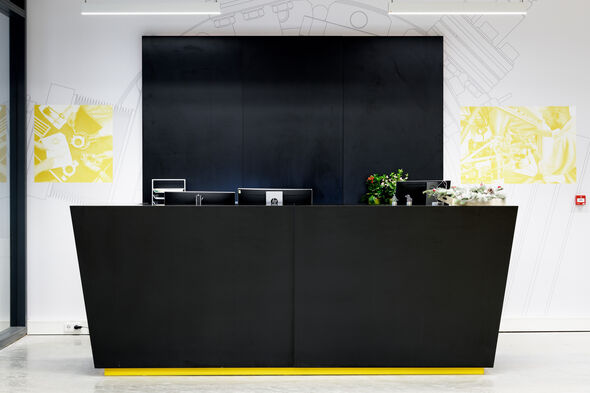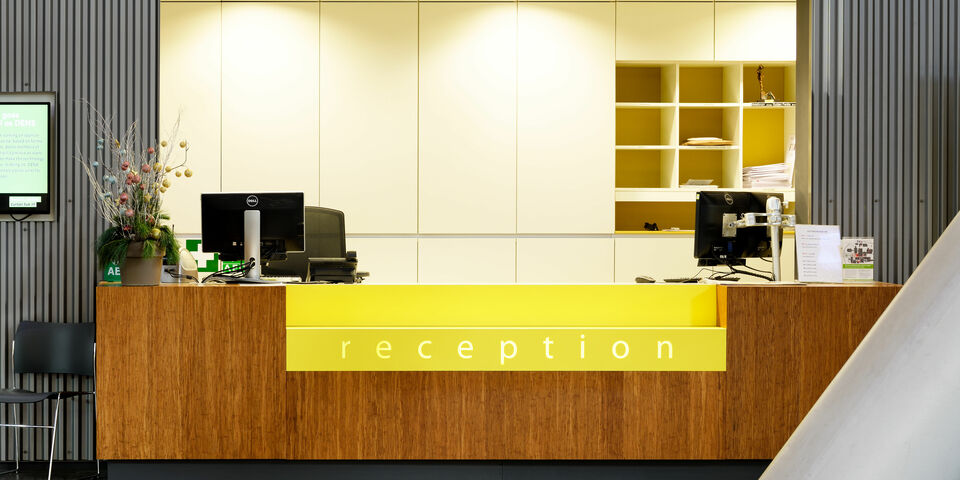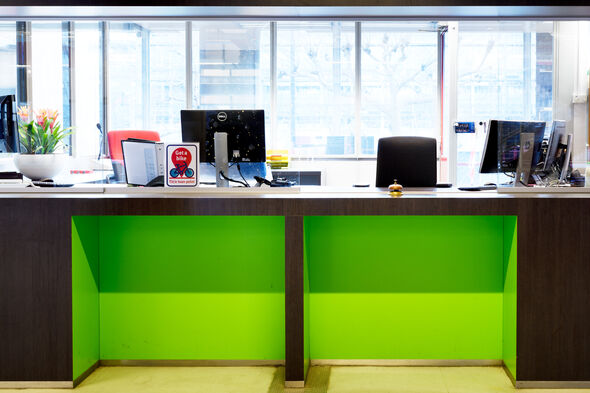Some receptionists still facing uncertain future
Some of the fourteen receptionists, all of them still working at TU/e through Eurest Services, will leave the university as of January. As the contract with TU/e comes to an end, Eurest will be passing the baton to Sparq. The receptionists have lately been deeply unsettled about their new positions. In the near future TU/e would like all its receptions to share the same look and feel and perform the same core services, as far as is possible.
“I have a job interview. Where should I go?”, “This letter needs to be sent as soon as possible. How can I arrange that?”, “There should be a tool here for me. Can you see it?” And, “Do you have a spray can for removing what's been written on the whiteboard?” You hardly need to spend any time at all at the various receptions on campus to see that the receptionists are asked a constant stream of varied questions – over the phone, by email, but mainly at the reception desk.
Seven years ago TU/e entered into a contract with Eurest Services; not only for its catering, but also for reception and security services. When it was announced this year that with effect from 2019 the university would be partnering with two new caterers, Eurest decided to call time on the two other branches of its service provision and not to compete for the new contract. This was awarded to Sparq in October, tells Peter Bloemers, TU/e's head of Safety & Security and Location Management.
Uncertainty
Fourteen receptionists and seven security staff have faced a long period of uncertainty about their work at TU/e - and some are still awaiting clarity. These security staff - hired by Eurest from security company Trigion - form a ‘flexible shell’ in addition to TU/e security's own permanent staff of fourteen. This flexipool of security staff works not only for TU/e from time to time, but also, for example, at DAF or on the High Tech Campus. Bloemers tells us that some of them who used to work through Eurest will now be coming here through the company NVG. “I also know that a number of security staff have decided to stay with their current employer.” In relation to the reception staff, he says that, “Several interviews have been held with all these people. At the end of the day, a few of the women will not be staying on at TU/e, for various reasons, but this has been decided in good consultation with Sparq. In the meantime, TU/e has been kept abreast of the process by Sparq.”

Unsettled
For most of the fourteen receptionists, the university is their regular place of work. It appears from talking to them that they have felt deeply unsettled about their future in recent weeks. One of them is Marijke van Vlijmen. Through Eurest, she has been working at TU/e receptions for the past seven years, sixteen hours a week. Over the years you may have seen her at work in Traverse, the Laplace building, Helix, Flux, Matrix, the Main building and Potentiaal. We caught up with her in Traverse on a day that was reasonably quiet. Van Vlijmen now knows that in principle she can continue working sixteen hours a week at TU/, although she hasn't yet decided whether she wants to carry on doing so in January - when Sparq would become her employer. “It is unfortunate how things have gone. Eurest could have told us earlier, for example, that they weren't taking part in the call for tenders. Or TU/e could have. At some point online vacancies at Sparq were doing the rounds and Eurest urged us to apply for them, so we did. It's a matter for three parties to decide, and so you don't know who you'd be best off approaching. I like working at TU/e, but I'm not certain whether I want to stay on. I want to see my contract first, before I make a decision.”
Familiar face
Similarly Carin Bakers, who has been working at TU/e for no fewer than eleven years, does not yet know whether she can continue working as a receptionist at TU/e. She is a familiar face in Gemini, MetaForum, the Laplace building, Traverse and Matrix. “I really enjoy working in this dynamic environment,” she stresses, “but according to Sparq's terms and conditions I'd have to work late into the evening and on weekends. Added to which, I now have a contract for 32 hours and if I keep on working, I'll only be offered 24 hrs. What's irritated me more than anything is that it took so long before there was any communication. It all takes its toll on you.” When Cursor spoke with them, the 13th of December, both Bakers and Van Vlijmen were still waiting for the new contract, due to take effect in January.
Peter Bloemers acknowledges that TU/e also plays a role in the communication. “We knew for a while that the contract with Eurest would come to an end and had conversations with them on this point. The call for tenders was still open and we wanted to communicate the news as soon as the contract had definitely been awarded. But at the same time I do understand that hearing little or nothing until that time has been unsatisfactory for employees. Ultimately the communication with staff is an issue between Eurest and its people.” Eurest let it be known that it did not wish to respond to this article.
Regular pool
Ruud van den Eijnden has now been working at TU/e for more than twenty years. He is a permanent TU/e employee at the reception of MetaForum and his job is not at risk. In fact, he will be retiring next year. He sympathizes with the 'fate' of the receptionists, and he thinks it would be easier to work with a regular pool of employees. “There's been so much coming and going among staff lately. That's tricky. It makes more sense to have regular staff, people who know the buildings well.”
Student faction Groep-één
Only recently, student faction Groep-één was still asking questions about acquiring the staff at the meeting of the University Council. Among other things, the faction wanted to know why TU/e did not make it a requirement that Sparq had to take on the Eurest reception staff. In response, Jo van Ham, vice president of the Executive Board, said that the matter ‘strictly speaking, did not concern TU/e employees’. “The collective employment agreement of the reception staff makes no mention of an obligation to take them on. However, we ourselves feel an obligation to provide some help and are having constructive discussions with Sparq. An additional consideration is that the reception services must become more professional. Whether the competences of the current reception staff are a good match with this ambition is being looked into. We trust good solutions will be found, but cannot give any guarantees.”The present staff won't find themselves out on the street. If the new party does not wish to take on these people, they will still be employed by Eurest.
The trade unions have likewise asked questions about the staff being taken on, says Marjo van der Valk, spokesperson for the collective trade unions. “But it's not something we have any say in because these people are not TU/e employees.”
Flexibility
Can't TU/e give these staff, who have been familiar faces on campus for years, permanent contracts? We put this question to Peter Bloemers. “Student numbers in a department can rise or fall substantially and, as a result, the opening hours of the building can change. Moreover, buildings are occasionally closed temporarily or undergo renovation. For reasons like these, we need to build in flexibility. We achieve this by using a hybrid model of in-house employees and external service providers. What's more, we are aware that market parties can help us with the development and improvement of the service provision.”
TU/e is keen to change the reception services in various ways. According to Peter Bloemers, these changes were already in the pipeline, but the planned completion of Atlas served to accelerate the process. “The services provided by receptionists vary quite considerably from building to building. To give a concrete example: one reception will have an umbrella you can borrow whereas another one won't. In the Laplace building the reception can loan overhead projectors, but in Atlas we have no space to store things. In recent months we have charted the processes and we want to professionalize the services. We are going to make a start with that in Atlas and then roll it out in the coming months.”
Open character
According to Bloemers, it goes without saying that the desks will continue to be staffed. “We aren't going to switch to robots.” Another certainty is that all the desks will be given an ‘open’ character. To achieve this, the receptions of the Laplace building, Gemini, Helix and likely also Vertigo will have to be remodeled.
Safety protocols
The document ‘Reception Services; a vision’, prepared by Internal Affairs and which the TU/e managing directors adopted in 2018, has been given to Sparq, so they can establish the job profile for the receptionists. Thus, ‘it is important that Sparq deploys regular staff who are knowledgeable about the building and its occupants. Particularly in buildings where risks are present, such as Helix, Flux, Cascade and Spectrum it is important that the receptionist is familiar with safety protocols and acts accordingly.’ For the rest, it is advised that all receptionists are provided with the same work clothing. In 2019 Internal Affairs wants to start using a Facilities Management Information System; this will enable receptionists to immediately inform the back office of technical failures and reports received. Increasingly, reception staff will become the first point of contact in a building, that's the plan. The core services offered by the receptions must be the same everywhere, and on a building by building basis any additional wishes will be identified.
If and when all the proposals will be implemented is something Bloemers cannot say with any certainty. “In the first instance, the vision document offers a guideline for bringing uniformity to reception services and, later on, for developing services. Whether everything in the document will be introduced, I don't know. In Sparq we have found a party with whom we can look to the future. Market trends may mean we fast track a number of things or that we don't do them at all.”




Discussion